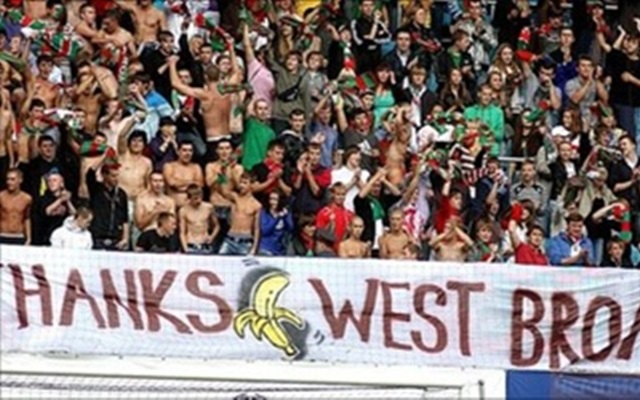Why FIFA’s anti-racism talk is so cheap
The World Cup in South Africa was widely recognised as an example of sport’s ability to unite different cultures. Indeed, football’s governing body used the tournament to make a big show of their commitment to driving racism out of the game.
Team captains gave speeches to the crowd in support of FIFA’s anti-racism campaign before each quarter-final match. They then joined teammates and match officials standing in solidarity behind a large Say No to Racism banner.
Two months on and FIFA’s handling of another banner shows that sometimes talk is cheap.
Russian Club Lokomotiv Moscow escaped punishment from the Russian Football Union (RFU) last month, despite their fans displaying a racist flag aimed at departing Nigerian striker Peter Odemwingie.
The sign had the slogan Thanks West Brom, in reference to the English team that recently bought the under-performing striker from Lokomotiv. It also had a picture of a banana right in the middle.
An RFU investigation concluded that there was nothing racist about the placard, claiming it was just an innocent joke; they argued that ‘to get a banana’ in Russian slang means to ‘fail a test somewhere’.
Regardless of this excuse, the image of bananas being thrown at black players is still too fresh in the memory of many to render this type of ‘joke’ acceptable.
Russian sports minister Vitaly Mutko claims English media coverage of the incident has been “disrespectful” to Russian football. The accusation of seizing upon a one-off incident in a bid to discredit a 2018 World Cup hosting rival has been levelled.
This is the same ‘respectful’ Russian football that has seen Spartak Moscow fans greet new Brazilian striker Welliton with a Monkey go home banner. The same ‘respectful’ Russian football where Zenit St Petersburg’s Dutch manager Dick Advocate admitted that he would happily sign anyone, but his clubs fans “don’t like black players”.
FIFA and their European counterparts UEFA have done nothing to challenge the RFU’s decision, claiming they are powerless to intervene. Apparently only the competition organiser, in this case the RFU, can issue sanctions.
While this approach might follow the letter of football law, it does nothing to promote the spirit of the game. It’s like the police saying that they can’t prosecute a teenage burglar because the parents have decided that their child is not guilty.
FIFA and UEFA have shown their leniency in punishing racism in the past, with numerous examples of tough talking followed up with soft punishments.
The Spanish Football Federation (SFF) were fined less than £45,000 in 2004 after fans directed monkey chants at England’s black players. To put that figure into context, the SFF earned $30m (£19m) from FIFA for winning the World Cup.
In July this year, Macedonian club FC Rabotniki were fined just £8000 for racist chanting and taunts from their fans in a Europa League qualifier against Liverpool. Despite being conclusively beaten by the English side, FC Rabotnicki still banked over £75,000 from FIFA for the tie.
FIFA talk the talk on tackling racism. Their brand commitment grandly declares they have “an even greater responsibility to reach out and touch the world, using football as a symbol of hope and integration.”
Well-placed intentions perhaps, however actions speak louder than words. Fittingly, the actions of West Brom’s supporters provided the perfect response to the Odemwingie affair.
During the first match following the scandal, they unveiled a banner with a picture of the striker celebrating the winning goal against Sunderland on his debut. The accompanying message? Thanks Lokomotiv!
English football has certainly been responsible for its fair share of racist behaviour in the past but unlike in Russia, the problem has been acknowledged. Great strides have been made through the likes of the Kick it Out and Football Unites, Racism Divides campaigns, although a minority of small-minded bigots remain.
Perhaps FIFA will reflect on each country’s progress when considering whether England or Russia is awarded the honour of hosting the 2018 World Cup. In deciding the winner, FIFA have an opportunity to show they can do more than just talk a good game.
Related Links
[insert-html-here 21]

